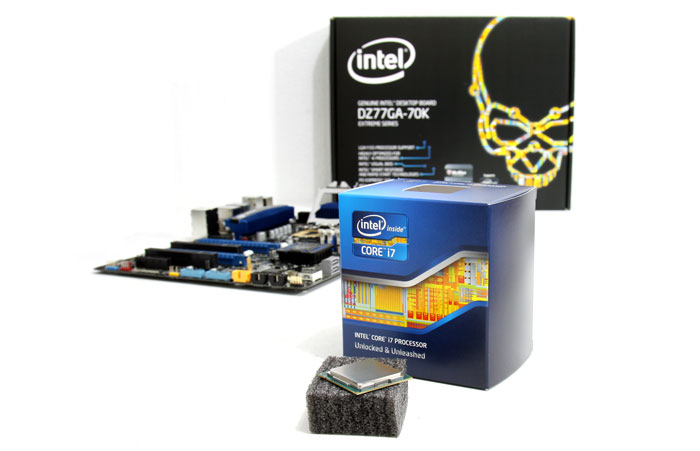Introduction

It was over a year ago that Intel hit the market with the Sandy Bridge processor, in fact in January 2011 prior to CES they had launched the oh-so successful Core i5/7 2500/2600 series processors. It was a tick, followed by a tock... Sandy Bridge-E. To date, these have proven themselves to be a very sturdy series of processors.
Time passes though and it is time for another 'tick' in that tick-tock' model from Intel. We've been hearing about it for a while now, you guys and girls have learned to know it as the Ivy Bridge series of processors.
Let me put it very simply, you take say a Sandy Bridge Core i7 2600/2700K processor, apply it to a smaller fabrication node (22nm), increase the Turbo a little, increase the graphics performance a little and bam... that's a Core i7 3770K processor.
See, performance wise the all new Ivy Bridge series is not going to stun and shock like the Sandy Bridge series did. In fact clock for clock it is all roughly the very same, with a +0.8% performance offset in favor of Ivy Bridge.
However -- with Ivy Bridge comes increased overclockability, the platform comes with native USB 3.0, we get PCIe Gen 3 for the fastest graphics cards and overall just a really fast processor series.
What about CPU cores man? Even there it's still the same, the Initial Ivy Bridge launch wave of processors will be quad core based, and that's probably a good sweet spot for Intel.
Look what happened with AMD's FX series eight core processors. See, you can add more and more cores, in the consumer market we've gone from 1 to 2 to 4 to 6 to 8 CPU cores, even up-to 12 cores in the next year or so. But software anno 2012 will take the best advantage of 2 to 4 CPU cores really, once you pass four CPU cores only professional applications and content transcode software gain a real benefit for that amount of multiple cores.
Faster per core performance is what we have been stating matters the most. Seriously, I'll take faster per core performance anytime when I'd have to choose in-between faster performing per core 4 or say 6-core processors. Exactly here is where Ivy Bridge hits a sweet spot.
Ever since Sandy Bridge there has been another massive change inside the processor, integrated graphics processor cores working in symbiosis with the CPU, even sharing cache, embedded and harbored inside the processor. It all started with the Core i5 650, 660 and 661 processors but these CPUs had two little small chips on the processor die, literally. And that has changed as both Sandy Bridge and Ivy Bridge have embedded IGPs.
For Ivy Bridge the IGP has certainly gotten a good chunk faster, as they must compete with AMD's really excellent implementation. Next to that, the IGP is now DirectX 11 compatible as well.
Today of course we'll be reviewing Intel's latest architecture, developed under family codename Ivy Bridge. Amongst others, Intel today officially announced the Core i7 3770K processor. Actually, they released several processors which we'll discuss on the next page.
Why K versions you ask? Well, the default Ivy Bridge processors are much harder to overclock. With past-gen processors you pretty much took your base clock of 133 MHz and apply say a default multiplier of 25, that would be your 3.33 GHz processor. That base clock was capable of going so much higher, 150, 186 and when tweaked right, even over 200 MHz. The new technology however has an embedded GPU / video processor merged into the very same processor die running over the same bus sharing the same L3 cache memory, things get increasingly complicated in matters of tweaking.
The 100 MHz baseclock of Ivy Bridge processors therefore is harder to tweak. And that is why Intel introduced the K series, it will offer you an unlocked multiplier which will allow you to go much, much higher.
With all the rumors on limited overclocking, the one thing that did surprise us was the overclocking potential with these K series processors, but of course we'll show you a nice overclock session, and in fact all today's test benchmarks will carry overclocked test results with the 3770K processor running at 4900 MHz, on an air cooler.
Enough of that for now though, today we'll put the Intel Core i7-3770K processor to the test, we will pair the processor with the Intel Desktop Motherboard DZ77GA-70K. Have a peek at the kit used below and then let's head onwards to the next page.


